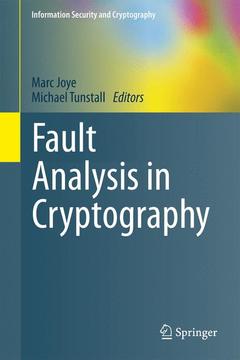Description
Fault Analysis in Cryptography, 2012
Information Security and Cryptography Series
Language: English
Subjects for Fault Analysis in Cryptography:
Publication date: 07-2014
356 p. · 15.5x23.5 cm · Paperback
Publication date: 06-2012
356 p. · 15.5x23.5 cm · Hardback
Description
/li>Contents
/li>Biography
/li>Comment
/li>
In the 1970s researchers noticed that radioactive particles produced by elements naturally present in packaging material could cause bits to flip in sensitive areas of electronic chips. Research into the effect of cosmic rays on semiconductors, an area of particular interest in the aerospace industry, led to methods of hardening electronic devices designed for harsh environments. Ultimately various mechanisms for fault creation and propagation were discovered, and in particular it was noted that many cryptographic algorithms succumb to so-called fault attacks.
Preventing fault attacks without sacrificing performance is nontrivial and this is the subject of this book. Part I deals with side-channel analysis and its relevance to fault attacks. The chapters in Part II cover fault analysis in secret key cryptography, with chapters on block ciphers, fault analysis of DES and AES, countermeasures for symmetric-key ciphers, and countermeasures against attacks on AES. Part III deals with fault analysis in public key cryptography, with chapters dedicated to classical RSA and RSA-CRT implementations, elliptic curve cryptosystems and countermeasures using fault detection, devices resilient to fault injection attacks, lattice-based fault attacks on signatures, and fault attacks on pairing-based cryptography. Part IV examines fault attacks on stream ciphers and how faults interact with countermeasures used to prevent power analysis attacks. Finally, Part V contains chapters that explain how fault attacks are implemented, with chapters on fault injection technologies for microprocessors, and fault injection and key retrieval experiments on a widely used evaluation board.
This is the first book on this topic and will be of interest to researchers and practitioners engaged with cryptographic engineering.
Part I - Introductory Material.- Chap. 1 Side-Channel Analysis and Its Relevance to Fault Attacks.- Part II Fault Analysis in Secret Key Cryptography.- Chap. 2 Attacking Block Ciphers.- Chap. 3 Differential Fault Analysis of DES.- Chap. 4 Differential Fault Analysis of the Advanced Encryption Standard.- Chap. 5 Countermeasures for Symmetric-Key Ciphers.- Chap. 6 On Countermeasures Against Fault Attacks on Advanced Encryption Standard.- Part III Fault Analysis in Public Key Cryptography.- Chap. 7 A Survey of Differential Fault Analysis Against Classical RSA Implementations.- Chap. 8 Fault Attacks Against RSA-CRT Implementation.- Chap. 9 Fault Attacks on Elliptic Curve Cryptosystems .- Chap. 10 On Countermeasures Against Fault Attacks on Elliptic Curve Cryptography Using Fault Detection.- Chap. 11 Design of Cryptographic Devices Resilient to Fault Injection Attacks Using Nonlinear Robust Codes.- Chap. 12 Lattice-Based Fault Attacks on Signatures.- Chap. 13 Fault Attacks on Pairing Based Cryptography.- Part IV Miscellaneous.- Chap. 14 Fault Attacks on Stream Ciphers.- Chap. 15 Interaction Between Fault Attack Countermeasures and the Resistance Against Power Analysis Attacks.- Part V Implementing Fault Attacks.- Chap. 16 Injection Technologies for Fault Attacks on Microprocessors.- Chap. 17 Global Faults on Cryptographic Circuits.- Chap. 18 Fault Injection and Key Retrieval Experiments on an Evaluation Board.- References.




